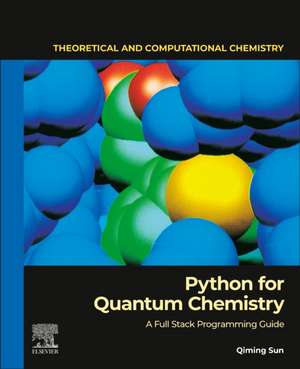Python for Quantum Chemistry: A Full Stack Programming Guide: Theoretical and Computational Chemistry, cartea 23
Autor Qiming Sunen Limba Engleză Paperback – mai 2025
Qiming Sun, a developer of the popular Python package PySCF, provides a comprehensive, end-to-end practical resource for researchers and engineers who have basic Python programming experiences chiefly in computational chemistry but want to take their use of the software forwards to the next level, the book provides an insightful exploration of Numpy, Pandas, and other data analysis tools. Readers will learn how to manage their Python computational projects in a professional way, with various tools and protocols for computational chemistry research and general scientific computing tasks exhibited and analysed from a technical perspective. Multiple programming paradigms including object-oriented, functional, meta-programming, dynamic, concurrent, and vector-oriented are illustrated in various technology scenarios allowing readers to properly use them to enhance their program projects. Readers will also learn how to use the presented optimization technologies to speed up their Python applications, even to the level as fast as a native C++ implementation. The applications of these technologies are then demonstrated using quantum chemistry Python applications.
Python for Quantum Chemistry: A Full Stack Programming Guide is written primarily for graduate students, researchers and software engineers working primarily in the fields of theoretical chemistry, computational chemistry, condensed matter physics, material modelling, molecular simulations, and quantum computing.
- End-to end guide for advanced Python programming skills and tools related to quantum chemistry research
- Tackles the following questions: How can you ensure the Python runtime is manageable when the preliminary implementation becomes complicated or evolves many branches? How do I ensure that others' Python program works properly in my project? How do I make my Python project reusable for others?
- Covers in depth the crucial topic of Python code optimization methods with high-performance computing technologies
- Provides examples of Python applications with cutting-edge technologies such as automatic code generation, cloud computing, and GPGPU
- Includes discussion of Python runtime mechanism and advanced Python technologies
Preț: 735.03 lei
Preț vechi: 935.19 lei
-21% Nou
Puncte Express: 1103
Preț estimativ în valută:
140.65€ • 145.10$ • 117.37£
140.65€ • 145.10$ • 117.37£
Carte nepublicată încă
Doresc să fiu notificat când acest titlu va fi disponibil:
Se trimite...
Preluare comenzi: 021 569.72.76
Specificații
ISBN-13: 9780443238376
ISBN-10: 0443238375
Pagini: 506
Dimensiuni: 191 x 235 mm
Editura: ELSEVIER SCIENCE
Seria Theoretical and Computational Chemistry
ISBN-10: 0443238375
Pagini: 506
Dimensiuni: 191 x 235 mm
Editura: ELSEVIER SCIENCE
Seria Theoretical and Computational Chemistry
Cuprins
Part I: Python tools for chemistry research
1. Research environment in Python
2. Data processing
3. Scientific computing tools
4. IO
5. How to communicate with other programs
6. Code generation
7. Workflow and job scheduler
Part II: High performance computing with Python
8. Combining Python with other programming languages
9. Code performance optimization
10. Tensor
11. Parallelism
12. Python with GPU
Part III: Quantum chemistry method development with Python
13. Integral evaluation
14. Numerical optimization methods
15. Mean-filed methods
16. Post-Hartree-Fock methods
17. Molecular properties
18. Symmetry
1. Research environment in Python
2. Data processing
3. Scientific computing tools
4. IO
5. How to communicate with other programs
6. Code generation
7. Workflow and job scheduler
Part II: High performance computing with Python
8. Combining Python with other programming languages
9. Code performance optimization
10. Tensor
11. Parallelism
12. Python with GPU
Part III: Quantum chemistry method development with Python
13. Integral evaluation
14. Numerical optimization methods
15. Mean-filed methods
16. Post-Hartree-Fock methods
17. Molecular properties
18. Symmetry









